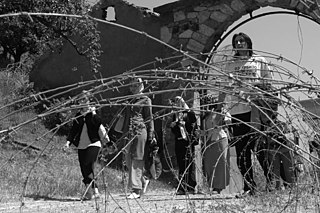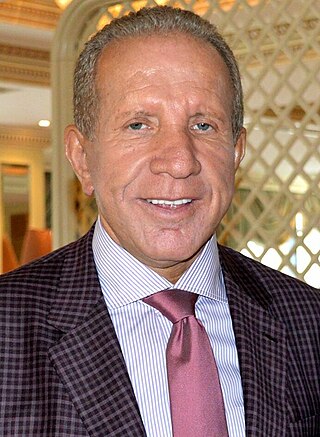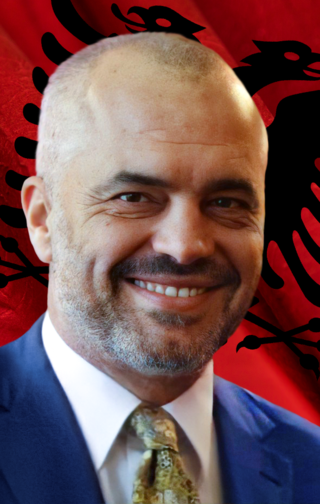| |||||
| Decades: | |||||
|---|---|---|---|---|---|
| See also: | Other events of 2014 List of years in Albania | ||||
The following lists events that happened during 2014 in the Republic of Albania .
| |||||
| Decades: | |||||
|---|---|---|---|---|---|
| See also: | Other events of 2014 List of years in Albania | ||||
The following lists events that happened during 2014 in the Republic of Albania .

Montenegro is a country in Southeastern Europe, on the Balkan Peninsula. Its 25 municipalities have a total population of 633,158 people in an area of 13,812 km². It is bordered by Bosnia and Herzegovina to the northwest, Serbia to the northeast, Kosovo to the east, Albania to the southeast, Croatia to the west, and has a coastline along the Adriatic Sea to the southwest. The capital and largest city is Podgorica, while Cetinje is the Old Royal Capital and cultural centre.

The State Union of Serbia and Montenegro or simply Serbia and Montenegro, known until 2003 as the Federal Republic of Yugoslavia, FR Yugoslavia (FRY) or simply Yugoslavia, was a country in Southeast Europe located in the Balkans that existed from 1992 to 2006, following the breakup of the Socialist Federal Republic of Yugoslavia. The country bordered Hungary to the north, Romania to the northeast, Bulgaria to the southeast, North Macedonia to the south, Croatia and Bosnia and Herzegovina to the west, and Albania to the southwest. The state was founded on 27 April 1992 as a federation comprising the Republic of Serbia and the Republic of Montenegro. In February 2003, it was transformed from a federal republic to a political union until Montenegro seceded from the union in June 2006, leading to the full independence of both Serbia and Montenegro.

Since the breakup of the Socialist Federal Republic of Yugoslavia in the early 1990s, the foreign policy of the newly established Federal Republic of Yugoslavia was characterized primarily by a desire to secure its political and geopolitical position and the solidarity with ethnic Serbs in other former Yugoslav republics through a strong nationalist campaign. While the country was involved in Yugoslav Wars and therefore exposed to several rounds of devastating sanctions against Yugoslavia this involvement was often denied for political or ideological reasons. In the initial period Federal Republic of Yugoslavia unsuccessfully aspired to gain international recognition as the sole legal successor state to SFR Yugoslavia, the country which was one of the most prominent foreign policy subjects during the Cold War.

The United Nations Interim Administration Mission in Kosovo is the officially mandated mission of the United Nations in Kosovo. The UNMIK describes its mandate as being to "help the United Nations Security Council achieve an overall objective, namely, to ensure conditions for a peaceful and normal life for all inhabitants of Kosovo and advance regional stability in the Western Balkans."

Edi Rama is an Albanian politician, painter, writer, former university lecturer, publicist and former basketball player, who has been serving as the 33rd and incumbent Prime Minister of Albania since 2013 and chairman of the Socialist Party of Albania since 2005. He was appointed Minister of Culture, Youth and Sports in 1998, an office he held until 2000. First elected mayor of Tirana in 2000, he was reelected in 2003 and 2007.
The Loro Boriçi Stadium, previously known as Vojo Kushi Stadium is a multi-purpose stadium in Shkodër, Albania, which is used mostly for football matches and is the home ground of Vllaznia. The stadium has a capacity of around 16,000 seated.

On 17–18 March 2004, violence erupted in the partitioned town of Mitrovica, Kosovo, leaving hundreds wounded and at least 14 people dead. The unrest was precipitated by reports in the Kosovo Albanian media which falsely claimed that three Kosovo Albanian boys had drowned after being chased into the Ibar River by a group of Kosovo Serbs. UN peacekeepers and NATO troops scrambled to contain a gun battle between Serbs and Albanians. Serbs call the event the March Pogrom, while the Albanians call it the March Unrest.

The South-East European Cooperation Process (SEECP) was launched on Bulgaria's initiative in 1996. At the Bulgaria-chaired meeting in Sofia, the Southeast Europe (SEE) countries laid the foundations for regional co-operation for the purposes of creating an atmosphere of trust, good neighbourly relations and stability.
The political status of Kosovo, also known as the Kosovo question, is the subject of a long-running political and territorial dispute between the Serbian government and the Government of Kosovo, stemming from the breakup of Yugoslavia (1991–92) and the ensuing Kosovo War (1998–99). In 1999, the administration of the Autonomous Province of Kosovo and Metohija was handed on an interim basis to the United Nations under the terms of UNSCR 1244 which ended the Kosovo conflict of that year. That resolution reaffirmed the territorial integrity of Serbia over Kosovo but required the UN administration to promote the establishment of 'substantial autonomy and self-government' for Kosovo pending a 'final settlement' for negotiation between the parties.

Aleksandar Vučić is a Serbian politician serving as the president of Serbia since 2017. A member of the Serbian Progressive Party (SNS), he previously served as the president of the SNS from 2012 to 2023, first deputy prime minister from 2012 to 2014, and prime minister of Serbia from 2014 to 2017.
The 2008 Kosovo declaration of independence, which proclaimed the Republic of Kosovo to be a state independent from Serbia, was adopted at a meeting held on 17 February 2008 by 109 out of the 120 members of the Assembly of Kosovo, including the Prime Minister of Kosovo, Hashim Thaçi, and by the President of Kosovo, Fatmir Sejdiu. It was the second declaration of independence by Kosovo's Albanian-majority political institutions; the first was proclaimed on 7 September 1990.

The establishment of diplomatic relations between Albania and the Soviet Union happened on April 7, 1924. Both countries were also allies in the Warsaw Pact. Albania has an embassy in Moscow. Russia has an embassy in Tirana.

Kosovo unilaterally self proclaimed independence from Serbia in 2008, a move which Serbia strongly rejects. Serbia does not recognize Kosovo as an independent state and continues to claim it as the Autonomous Province of Kosovo and Metohija. However, differences and disputes remain, while North Kosovo is partially under Serbian rule. Initially there were no relations between the two; but in the following years there has been increased dialogue and cooperation between the two sides.

Behgjet Isa Pacolli is a Kosovar Albanian politician and businessman who served as the first deputy prime minister of Kosovo and minister of foreign affairs from 2017 to 2019 under the Ramush Haradinaj government. Pacolli is a former president of Kosovo, and served as the first deputy prime minister of Kosovo between 2011 and 2014. Pacolli was one of the signatories of the 2008 Kosovo declaration of independence.

Relations between Albania and Serbia have been complex and largely unfriendly due to a number of historical and political events.

The first Government of Prime Minister Edi Rama was the 65th ruling Government of the Republic of Albania formed on 15 September 2013.
Conference of Western Balkan States was a 28 August 2014 conference of heads of states and governments of Western Balkans region initiated by German chancellor Angela Merkel. An idea for organization of conference came in light of the celebration of the 100th anniversary of the beginning of World War I. It is the first conference in this framework and organizers expressed their desire to continue it in future with Vienna and Paris mentioned as a potential next hosts after Berlin. Günther Oettinger confirmed at conference that event will be organised annually with Vienna as a host city in 2015 and Paris in 2016.

A UEFA Euro 2016 qualifying match involving the national association football teams of Serbia and Albania took place on 14 October 2014 at Partizan Stadium, in Belgrade, Serbia. The match was abandoned after several incidents of hooliganism took place both on and off the field. Serbian fans had chanted "Ubij, ubij Šiptara", and threw flares and other objects on the pitch. At that point a drone quadcopter carrying an Albanian nationalist banner with an image of Greater Albania appeared on the pitch.

The 2017 European Athletics Indoor Championships were held between 3 and 5 March 2017 at the Kombank Arena in Belgrade, Serbia. This was the second time this event was held in the city after the 1969 edition then known as the European Indoor Games, and the first time in more than 30 years that the competition was held in Eastern Europe. The three-day competition featured 13 men's and 13 women's athletics events and took place over two morning and three afternoon sessions.

The Open Balkan is an economic and political zone of three member states in the Balkans, those being Albania, North Macedonia and Serbia. The zone has a total area of 131,935 km2 (50,940 sq mi) and an estimated total population of almost 12 million located in Central and Southern Europe. The official languages are Albanian, Macedonian and Serbian. Its administrative centres are the cities of Belgrade, Skopje and Tirana. With the establishment of the zone, all three member states aim to increase trade and cooperation as well as improve bilateral relations.